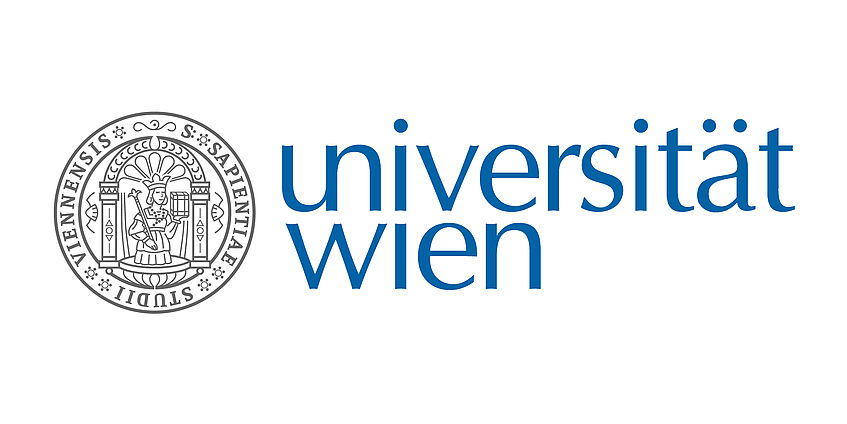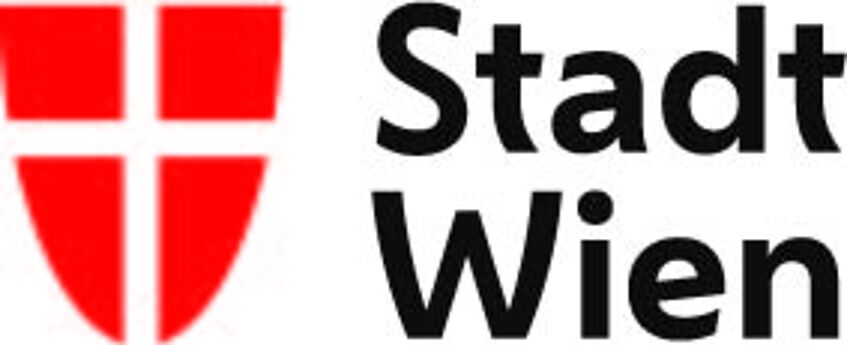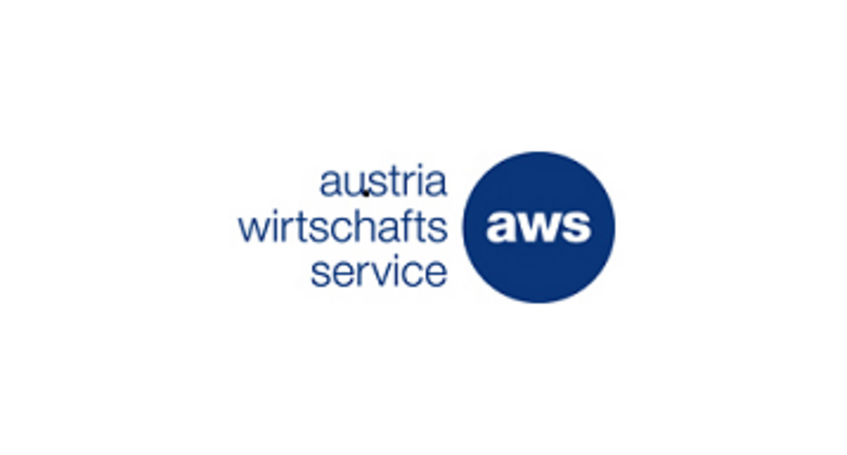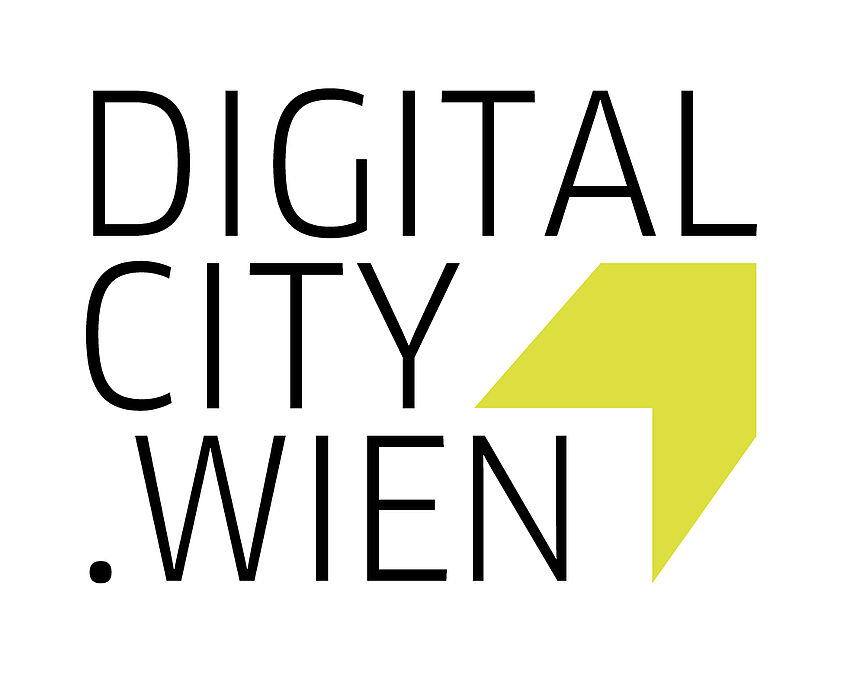Hackathon

Digital solutions for society– Vienna Climate Challenge
After organising Hackathons as part of the WTZ-Ost (Knowledge Transfer Center East), resulting in fantastic, innovative, digital solutions for current societal challenges, we continue organising Hackathons together with the City of Vienna.
18-20 September 2023
Vienna aims to be climate-neutral by 2040. The Vienna Climate Guide sets out the targets for achieving this. (Find more details at: https://www.wien.gv.at/spezial/klimafahrplan/) Determination, commitment, creativity and new ideas are needed to achieve climate neutrality. And that is exactly the goal of the Hackathon Vienna Climate Challenge 2023: Within this specific framework, bottom-up innovative solutions are developed to support Vienna on its path towards climate neutrality. Be part of it and help to make Vienna climate-neutral by 2040.
Take a look at the Agenda here.
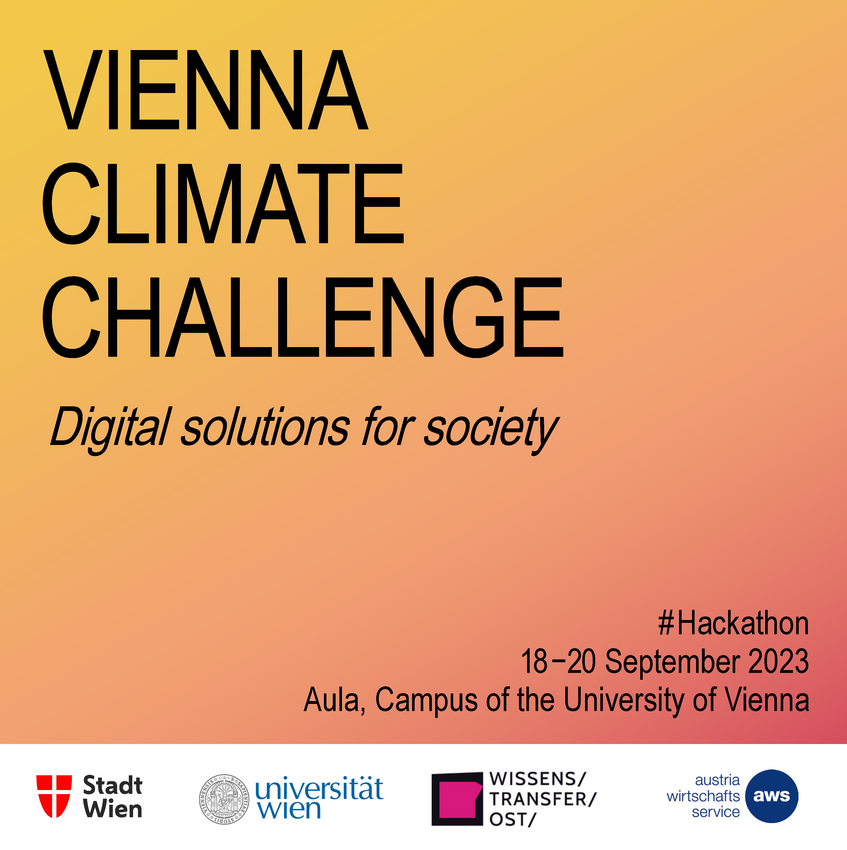
Location
Aula, Campus of the University of Vienna (Spitalgasse 2, 1090 Vienna, Austria)
The Hackathon is a physical event, you need to be on site.
For whom?
Students and early career researchers can either apply as individuals and be matched with others on site or can join as a team (max. four people).
Programming skills are neither required nor necessary.
Why?
- Are you interested in sustainable innovations?
- Do you want to work in interdisciplinary teams?
- Do you want to develop ideas to improve living conditions in sustainable cities and communities?
- Do you want to apply your theoretical knowledge to the development of solutions for current societal challenges?
What is a Hackathon?
In a nutshell, a hackathon is a challenge where people come together in a limited period of time to develop experimental, creative solutions to specific problems. Although its origins lie in software and hardware development, it can be quite flexible in terms of duration, topics, or the degree of focus on technological/digital solutions.
All-female teams
In cooperation with She.Digital Wien and DigitalCity.Wien, we would like to additionally address young women to participate in this hackathon and form all-female teams with other researchers/students, to present their ideas and innovative solutions and thus to be a role model for younger female talents! The all-female winning team of the Hackathon 2023 will receive the opportunity to present their successful idea at the #DIDAYS23.
Challenges
The Hackathon is organised by the University of Vienna, the WTZ Ost, together with the City of Vienna. Climate change imposes major challenges, especially for cities. The City of Vienna defines concrete goals and measures for the city’s climate package, this is where the Hackathon wants to pick up. Interdisciplinary teams will work on concepts for (participatory) digital solutions to current challenges faced by the City of Vienna on climate.
Background information can be found here:
More challenges to be announced soon. Take a look at the 2022 challenges here.
Specific Challenges
-
Smart Climate Grätzl Monitoring
The climate crisis poses ever greater challenges worldwide, especially for cities. It demands ambitious solutions and the ability to adapt. As the binding umbrella and sustainability strategy of the City of Vienna, the Smart Climate City Strategy Vienna sets the path to a climate-friendly future and defines the long-term goals for climate protection, climate adaptation and circular economy. The main goal is to achieve climate neutrality by 2040. The already clearly noticeable effects of climate change require a permanent review and sharpening of the measures to guarantee the achievement of the goals proposed in the Smart Climate City Strategy Vienna.
The implementation of these goals must happen, among other things, at the neighbourhood level (in Grätzln). Here, the different framework conditions of different neighbourhoods must be taken into account to be able to define and implement the measures necessary to achieve the goals for each Grätzl in the best way possible. To support this, a monitoring is needed to be informed about the status of target achievement and to be able to adapt if necessary.
The challenge: How can such a monitoring look like? A monitoring which gives an overview of the status of the implementation of the Smart Climate City goals in each Viennese Grätzl, so that the achievement of the Smart Climate City goals can be guaranteed and Vienna is climate neutral and climate adapted by 2040?
Contact person: Lukas Franta, Municipal Department 18 Urban Development and Planning
Data:
- Auswirkungen des Klimawandels auf Wien
- Klimadaten Wien
Background information:
https://smartcity.wien.gv.at/en/strategy/
https://smartcity.wien.gv.at/en/approach/monitoring/
-
Integrated Decision-Making Tools for Mitigation Progress
Towards the goal of a climate neutral city in 2040, many sectors have to be integrated and many actors have to be brought together. It requires organisations to change and complex decisions to be made in a different way. In order to align decision making of various stakeholders like politicians, officials, businesses, citizens with the roadmap to climate neutrality, clear and solid information must be provided. Such an information base for decision making includes breaking down long-term goals to yearly goals, demarcating their spatial origins and effects, providing comparability to national and global goals and comparing the goals with the actual progress of today’s measures. As the time is running, we need to do such analysis regularly in order to be able to make decisions on how to adjust our measures. Digital tools could support this iterative decision making process through analysing and visualising emissions generated from energy production, heating and cooling buildings and mobility. Moreover, tools could take into account costs of measures, demografic change, material/energy budgets and trade-offs between sectors.
Contact person: Philipp Preuner, Directors Office for Climate Governance
- Treibhausgasemissionen nach Sektoren Wien
Background information:
https://www.wien.gv.at/spezial/klimafahrplan/
https://www.wien.gv.at/stadtentwicklung/energie/pdf/waerme-und-kaelte-2040.pdf
https://positionen.wienenergie.at/wp-content/uploads/2021/10/WE-DECARB21-Studie.pdf
https://www.umweltbundesamt.at/fileadmin/site/publikationen/rep0817.pdf
-
Retrofit and Save CO2
The city of Vienna is focusing on the increased expansion of renewable energies. Thousands of houses and apartments are to be climate-proofed for this purpose. This will save CO2 in the long term and sustainably. How much CO2 can be saved by switching to renewable electricity and heat supply in a building? What factors - age of the building, room volume, heating systems, etc. - do we need to take into account? The goal of the challenge is to design a tool that enables an estimate of the CO2 savings when converting a building.
Contact person: Franz Oberndorfer / Katharina Meissner-Schöller, Directors Office for Science, Research and Business Location, Chief Executive Office
- Schutzzonen Wien
- Gebäudeinformation Standorte Wien
- Energieraumpläne (Klimaschutz-Gebiete) Wien
- Gründachpotentialkataster Wien
- Solarpotentialkataster Wien
- Energieversorgung Wiener Wohnbauten
- Heizwärmebedarf sanierter Wohnungen Wien
- Emissionen für Heizen, Kühlen und Warmwasser pro Kopf Wien
- Potenzialkarte Erdwärmesonden Standorte Wien
- Potenzialkarte Thermische Grundwassernutzung Standorte Wien
Background information: https://wirsan.wien.gv.at/
-
Awakening the PUMA – Environmental Management Program in the City of Vienna’s Municipality
The City of Vienna has introduced an environmental management system - PUMA (Program Environmental Management in the Municipality), which has already been rolled out in all municipal departments. The departments have their own environmental manuals and have introduced measures to improve the environmental impact of their own services in the areas of energy, mobility and waste management. All implemented measures can be seen in a list that will be made available for the challenge. The success of practically all measures depends on the proactive participation and commitment of the employees. How can employees be motivated via a tool to consistently comply with the measures; to make their own behavior even more environmentally friendly; to improve CO2 savings, energy savings and resource conservation; and to develop further ideas for environmentally friendly solutions and behaviors? How can they be supported by a tool to understand the environmental impact of their own behavior in a playful, easy and understandable way – for example via visualizations or comparisons? The goal should not be to create pure calculations (e.g. CO2 calculator).
Contact person: Claudia Schrenk, PUMA-Commissioner of the Chief Executive Office
- Endenergieverbrauch im Magistrat nach Energieträgern
- Endenergieverbrauch im Magistrat nach Abteilungen - Energieeinsparungen ÖkoBusinessPlan nach Anwendungen
- Wärmeverbrauch im Magistrat nach Energieträgern
- Verbrauch elektrischer Energie im Magistrat - List of all implemented PUMA measures (will be made available)
Background information: PUMA Homepage
Open Challenges
-
Climate
We want to create a climate-friendly way of living together. How can digital solutions help us to act in a climate-friendly way and to design effective climate measures, or how can corresponding prototypes look like?
Contact person: Franz Oberndorfer / Katharina Meissner-Schöller, Directors Office for Science, Research and Business Location, Chief Executive Office
-
Re-use in Daily Life
With re-use, recycling and a longer life span of products, we can create a climate-friendly living. The circular economy encompasses many areas of people's lives from food supplies to electronic goods. How can we create even more awareness about recycling and preserving the lifespan of goods and products? What tools are available to make it easier for people to reuse and repair?
Contact person: Franz Oberndorfer / Katharina Meissner-Schöller, Directors Office for Science, Research and Business Location, Chief Executive Office
Data:
- Mistplätze Standorte Wien
- Altstoffsammelstellen Standorte Wien
- Problemstoffsammelstellen Standorte Wien
- Mobile Problemstoffsammelstellen Standorte Wien
-
Low CO2 vacation
Vacation travel costs money and CO2 – but not necessarily. Even apart from the Prater and the Danube, we can travel with low CO2 emissions. But we need tools that help us plan our vacation and organize the trip. What digital solutions are there or can be conceptualized for planning a low-CO2 vacation?
Contact person: Franz Oberndorfer / Katharina Meissner-Schöller, Directors Office for Science, Research and Business Location, Chief Executive Office
Data:
- Hotels und Unterkünfte Standorte Wien
- Hauptradverkehrsnetz Wien
- Öffentliches Verkehrsnetz Haltestellen Wien
- Öffentliches Verkehrsnetz Linien Wien
- Campingplätze Standorte Wien
- Schiffanlegestellen Standorte Wien
- Touristische Kategorien Standorte Wien
General issues
-
Prizes
A jury will assess the teams' pitches and will award €1.000 prize money, provided by the City of Vienna.
The City of Vienna is open to a further collaboration on relevant and interesting projects arising out of the Hackathon.
The all-female winning team of the Hackathon 2023 will receive the opportunity to present their successful idea at the #DIDAYS23.
-
How to apply?
Application ended on 4th September.
Accomodation and travel expenses cannot be reimbursed.
-
Who can participate?
Students and early career researchers from all disciplines can apply, either as a team or as individuals. Programming skills are welcome, but are not essential for participation (we are looking for prototypes or concepts for a possible digital solution).
You will work in interdisciplinary teams, it is not about programming, but about concidering various aspects when working on a prototype/concept for digital solutions.
Teams will be evaluated by a jury.
-
What is the format?
We will host the Hackathon for a maximum of 30 people.
You may come with your own team or be matched with other participants to tackle challenges around the topic of Climate and Sustainable Development Goals. You will be advised by people from the industry, technical experts, and policymakers. The whole Hackathon will be free of charge and food and drinks are on us.
You will work in teams on a challenge within the limited timeframe and prepare a pitch in front of the jury. The focus is on developing a prototype or a concept for a digital solution (programming skills are not mandatory. There are convenient tools that do not require programming skills, such as design software, whiteboards that help you visualise your project. Remember, you will be working in teams).
The final pitch in front of the jury is the one that counts, they will decide on the winning team! Prepare well for it.
What you will do with your ideas after the hackathon is up to you! Whatever you plan – whether it’s founding a social business or further developing your ideas together with experts from our cooperation partners: we’ll support you! We do not claim any rights on your projects.
-
Teams
You register as an individual: on the first day of the event you will meet the other participants, we will prepare some getting to know each other exercises and teams will be matched on site
You register as a team: your team can consist of a maximum of four people, every teammember to register separately, please enter a name for the team.
Take a look at the Hackathons in 2020 and 2021, organised within the framework of WTZ Ost as well as at 2022. If you want to know more about why we are organising these kind of events, read the second issue of the REVALORISE+ e-zine.
Find a review on the Hackathon 2022 here, a blog entry by one of the 2022 participants here. You can take a look at the 2022 challenges here.
Beitrag im #Digitalmondayblog - Digital City.Wien


Das WTZ Ost ist gefördert durch die aws, aus Mitteln der Nationalstiftung für Forschung, Technologie und Entwicklung (Österreich-Fonds).

